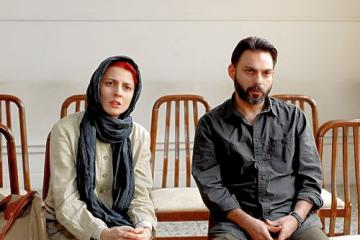Oscar-nominated `A Separation' probes social and religious oppression in Iran
Now that American and Israeli hawks are prepping us for a new war, against Iran, it might be a good time to gain a little insight into the people they want us to attack -- however Satanic we think their religious verses are.
Note the use of "people" rather than "country," above. Iranian director Asghar Farhadi's "A Separation" has nothing to do with Islamofascist politics. There's not an ayatollah or a terrorist or a nuke in sight. But there's a Quran or two in Mr. Farhadi's mesmerizing domestic-courtroom drama, which is Oscar-nominated for best foreign film and best original screenplay -- with a virtual clean sweep of the other awards (Golden Globes, New York Film Critics Circle, Berlin Film Festival) already under its belt.
At issue is a wrenching divorce dispute and custody battle, initiated by wife Simin (Leila Hatami) against husband Nader (Peyman Moadi): Fed up with the constraints against women in Iran, she wants to improve her own life -- and the opportunities of their bright, bookish daughter -- by moving abroad. Nader feels deeply obligated to stay in Iran and care for his father, a rapidly deteriorating Alzheimer's victim.
It's really a no-fault situation, in theory and fact: "He's a good, decent man," says Simin at the inquest. There's no hint of abuse, infidelity or even incompatibility on either side. But Iranian law requires divorce/custody requests to be mutual, and Nader refuses.
Simin leaves husband and daughter -- though not the country. Nader hires Razieh (Sareh Bayat) to care for dad and the household while he's at work. But that serious woman is frightened, overworked and pregnant, and this job is more than she bargained for. She calls a religious hot line authority to ask if it's OK to change the old man's soiled pants (one sex may not see or touch the naked other). Her hotheaded husband gets involved. When she makes the mistake of briefly leaving her post while on duty, a disaster results.
So does a murder investigation.
It's not exactly Perry Mason, but it's perhaps the closest thing to a real-life Iranian legal proceeding we in the West have ever yet seen. It's actually an inquest, rather than a trial, but you'll be fascinated by the plaintiffs and defendants' right to interrogate and yell at each other.
You'll be even more fascinated by the restrained, naturalistic and painfully convincing performances: Mr. Moadi as Nader, stoically trying to fulfill his filial and fatherly duties; his terribly torn child (played by the director's real-life daughter Sarina); soulful Ms. Bayat as Razieh; heartbreaking Ali-Asghar Shahbazi as Nader's senile father; and Babak Karimi as the low-key, beleaguered interrogator.
Director Farhadi (whose filming was interrupted by Iran's Ministry of Culture and Islamic Guidance after he spoke out against censorship) calls it "a detective story without any detectives" but multiple victims. He leaves it to us, the viewers, to choose with whom we most identify. There's no single hero or villain. All of them are well-meaning and empathetic; all of them lie and tell the truth, in different ways and degrees. You never saw such equipoise among main characters.
The bottom line is a tense, emotionally involving and morally challenging exposé of Iran's oppressive religious, social and sexist protocols. Talk about "separation," on all levels: In a society where women are oppressed, men can never really live happily either.
And, hey -- how 'bout that Sharia law, huh? It's not so much a matter of fixed rules as of negotiations. Take that intriguing (and not-to-be-dismissed-out-of-hand) concept of blood-money settlements, for example: In the film, one party proposes 40 million Iranian rials (about $3,500) to end the matter. It's based on Sharia's "eye for an eye" idea: If a victim's family demands the death of the murderer, not only do they get no cash consolation, but then THEY, in turn, technically owe blood money to the murderer's family. In other words, paying blood money is a pragmatic way of gaining forgiveness and stopping the endless cycle of violence. (Come to find out, people can even buy auto insurance in which the company assumes liability for blood money in the event of car-accident deaths!)
So all of a sudden, I'm a Sharia lawyer? Blame it on Google. Next thing, you'll be demanding my birth certificate and place of nativity. It wasn't Tehran, and neither I nor you will come away from this film wanting to move there. But if God, Satan or war ever lands you in Iran, you'll be glad you saw it.
"Lies may lead to truth," says Mr. Farhadi. "The world needs more questions than answers. Answers prevent you from thinking."
(In Farsi with English subtitles. Rated PG-13 for mature thematic material.)
[Editor's Note: On Feb. 26, "A Separation" did indeed win the 2012 Academy Award for Best Foreign Language Film.]






